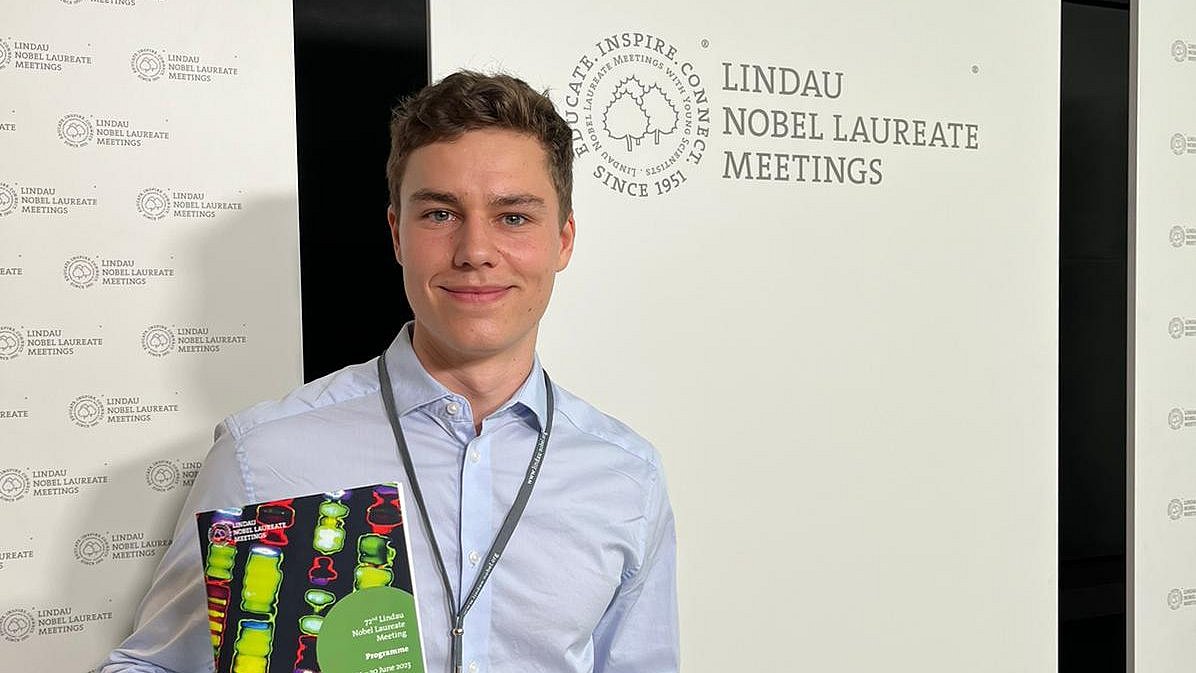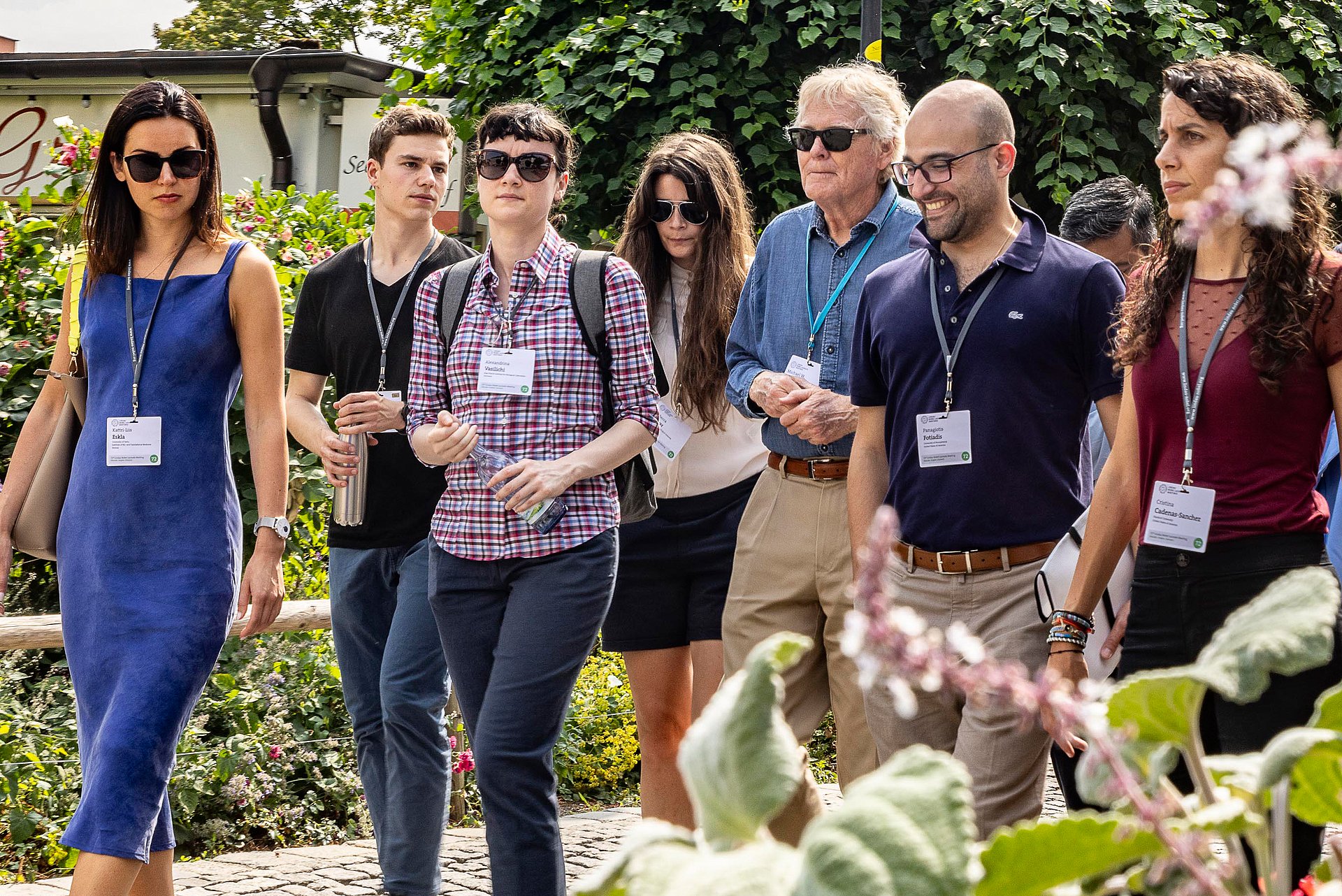Every summer hundreds of young researchers from around the world spend a week together with Nobel laureates in Lindau. This year medical student Leonard Schmitt was among the 600 young people attending in Lindau. And immediately after returning, the 25-year-old ran his first half-marathon in Munich.
 privat
privat Mr. Schmitt, did the "Lindau Spirit" follow you on the run today ?
(Laughs.) The motto in Lindau is "Educate. Inspire. Connect". And inspiration and connection are also very present in the world of running. When runners slow down or even stop, the others encourage them: "Come on, you can do it!" That's very uplifting and positive, both on the marathon course and in Lindau.
What were your expectations for Lindau?
I didn't have many scientific expectations, since there was such a broad spectrum represented in Lindau. I very much enjoy meeting people from other cultures. I wanted to make contacts and be inspired by the Nobel laureates, to find out more about their personal paths. My expectations were more than met in every respect.
Lindau offers a wide variety of exchange formats with laureates, for example "Life Lectures" and "Science Walks". Did this personal interaction take place primarily in events like that?
Actually, it took place everywhere. There were also events like the Agora Talks, the Laureate Lunches and an evening barbeque. Once, on my way to the restroom I met a laureate, started a conversation with him and spontaneously spent ten minutes together with him strolling in some random direction.
Tell us about a specific encounter you had.
I had my Science Walk with Michael Young, who won the Nobel Prize for his description of the Circadian Rhythms, the internal clocks of cells. I had set an alarm beforehand just to make sure I could sign up promptly. Ten of us young scientists walked around Lindau with him for an hour and a half and were able to ask scientific and personal questions. And we heard about how extreme the call can be, the news about the Nobel Prize, how it changes your life, that you're suddenly famous, a kind of star. That was very fascinating.
 Christian Flemming/Lindau Nobel Laureate Meetings
Christian Flemming/Lindau Nobel Laureate Meetings You conduct research on Helicobacter pylori, a bacterium in the stomach that interacts with other bacteria and causes cancer. What were you able to bring home from Lindau for your research work?
In scientific terms, I was most inspired by the fact that the individual road towards a successful career is in most cases not a straight one, that it always involves obstacles, a lot of frustration, and even failures. And also that what may feel like failure at first may also be nothing more than another building block on the way to success: As long as you remain persistent, keep your eyes open, that might be when you make the most exciting discovery, one you weren't even looking for. Just like in running, it's usually a hard road, and you don't stop training - or research - once you've reached the finishing line.
And what did you take away in personal terms?
A whole lot of contacts and friendships. Another thing that inspired me, both with the scientists and the Nobel laureates, was their commitment above and beyond science, the fact that they use their knowledge not only for research, but also to facilitate political and societal change. For example, Frances Arnold from the USA: She's a biochemist, a professor, conducts research and is also on a scientific panel advising President Biden.
It's traditional in Lindau to address societal topics as well. You were able to participate in a panel on "Climate Change and Health".
Among other things I'm active in the space of climate protection and prevention in medicine. Together with two other young scientists I was invited to present the point of view of the younger generation in this panel. One topic we touched on was climate justice. One young scientist came from Indonesia. This giant island group really experiences all the impacts of climate change quite directly: Floods, tropical storms and drought as well as increases in infectious disease as a result of the fact that the pathogens survive longer. This gave me a very specific, concrete idea of the situation outside my own "bubble", outside Germany, in general outside of the Global North.
What are your plans after you complete your doctoral dissertation?
I still don't know whether I want to work in a hospital or as a general practitioner in a practice. I could also imagine doing research in the area of climate change and health. I met two people in Lindau who are also from different fields and who had similar ideas. Right now I'm thinking about whether or not to do a Master's degree in Global Health after my medical studies.
- The Lindau Laureate Meetings have taken place since 1951.
- This year's participants came from the fields Physiology and Medicine.
- Leonard Schmitt is currently in his 10th semester of medical school at TUM.
- He experienced the Nobel laureates as "extremely approachable". "You know their names and you'd never imagine being able to actually talk to them." He added that he couldn't imagine a better format for intensive exchange between the generations.






